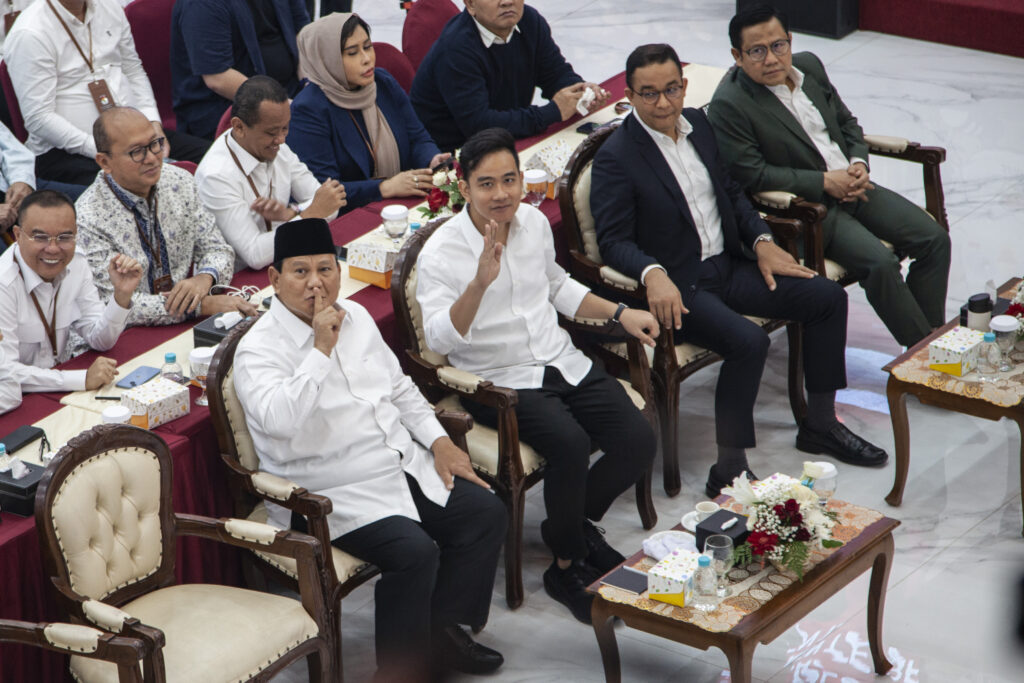Indonesia’s 2024 elections, marked an important milestone in the nation’s democratic trajectory. The electoral commission has declared Prabowo as the winner of the presidential election with 58.6 per cent of the vote, which translates to around 96 million voters.
But a more profound story is unfolding behind this electoral success, with scholars raising concerns about the troubling democratic decline in Indonesia. The election was rife with irregularities, such as the nomination of Gibran Rakabuming Raka, incumbent President Joko ‘Jokowi’ Widodo’s son, as well as the alleged politicisation of social assistance programs. These controversies serve as clear reminders of the challenges facing Indonesia’s democracy.
Gibran only became eligibile to run for the vice presidency after a special Constitutional Court ruling granted him the opportunity. While the court affirmed the previous age limit of 40 for those seeking candidacy, it introduced exemptions for individuals who have previously been elected as regional leaders. This decision facilitated 36-year-old Gibran’s candidacy for vice presidency in the 2024 election, as he had previously held the position of mayor of Surakarta.
But the integrity of the top court came under scrutiny amid revelations that Anwar Usman, the chairman of the judicial court, is Jokowi’s brother-in-law. The integrity of this state institution is now in doubt due to a series of questionable interventions and conflicts of interest which have undermined the electoral process.
Jokowi’s favouritism towards Prabowo and Gibran also sparked public criticism. Just days before the election, a documentary featuring law experts shed light on the government’s use of social assistance programs to secure political support — a tactic commonly referred to as ‘pork barrel politics’. The strategy, which involves allocating state funds to specific electoral areas to ensure victory, seems to have been successful — 69.3 per cent of voters who received social assistance voted in favour of Prabowo and Gibran.
Rumours also circulated that the social aid program would be discontinued if Prabowo and Gibran, who had obtained President Jokowi’s endorsement, were to lose in the election. Such revelations raise questions about the integrity of the electoral process, while highlighting the declining legitimacy of state institutions.
The decline in Indonesia’s democratic standards may have implications on Indonesia–Australia relations and Indonesian foreign policy in general. It may undermine the stable groundwork upon which Indonesia and Australia have cultivated stronger ties over the past two and a half decades.
Before Reformasi, the relationship between these ‘strangers next door’ was characterised by volatility, with Indonesia perceived as a strategic threat by Australia. The brief period of close rapport during the early to mid-1990s was sustained only by personal trust between leaders, connections that did not survive changes in leadership.
Post-Reformasi, Indonesia and Australia have discovered a more enduring basis for their relationship, moving beyond personal ties to a shared commitment to democratic values. This alignment has in turn allowed them to comfortably collaborate on shared concerns including human trafficking, counterterrorism and disaster relief. Despite occasional setbacks, the relationship has remained resilient and continues to progress overall. But future recalibrations of the relationship look uncertain, especially under shifting balances of regional power.
Within the broader context, democracy has historically enhanced Indonesia’s confidence in its foreign relations. During the Yudhoyono administration (2004–14), the promotion of democratic ideals and the positioning of Indonesia as a successful Muslim democracy became crucial foreign policy assets. This period witnessed Indonesia’s renewed leadership in ASEAN, as it introduced novel agendas such as the promotion of human rights and good governance to the regional organisation otherwise known for its ambivalence towards authoritarianism and strong adherence to non-interference. Indonesia also confidently articulated its vision for regional order, seeking to maintain a dynamic equilibrium.
In the aftermath of the 2024 elections, these dynamics are likely to shift. Under Prabowo, Indonesia will likely project even greater confidence on the international stage. But successful democratic transformation will become a less prominent source of Indonesia’s confidence, replaced by tangible markers of strength such as economic achievements and increasing military capabilities. This pragmatic shift to prioritising power over shared values is already evident in Prabowo’s choice of both China and Japan for his inaugural visits as president-elect.
The erosion of democratic norms may see a return to leader-centric foreign policymaking in Jakarta. The former general’s idiosyncrasies will likely exert a greater influence on both the timing and substance of Indonesian foreign policy given the minimal constraints that are anticipated on Prabowo’s regime, as well as his perceived expertise in foreign affairs.
Though systemic constraints arising from US–China rivalry will persist as the main driver of Indonesian foreign policy in the long term, the international community may need to brace for occasional glitches as Prabowo adopts a more hands-on approach to foreign policy.
Rizky Ihsan is an HDR Candidate at the School of Government and International Relations, Griffith University.
Muhamad Arif is an HDR Candidate at the School of Government and International Relations, Griffith University and 2024 Blue Security Fellow at La Trobe University.


Marked by deterioration of democracy and growing scepticism in state institutions, the 2024 Indonesian elections saw Prabowo Subianto declared the winner despite allegations of controversy, including the nomination of Jokowi's son and the politicisation of social aid programmes. This decline in Indonesia's democratic standing not only undercuts the bilateral relationship with Australia, established on shared democratic values, but also threatens to alter Indonesia's foreign policy to a more leader-centric approach.